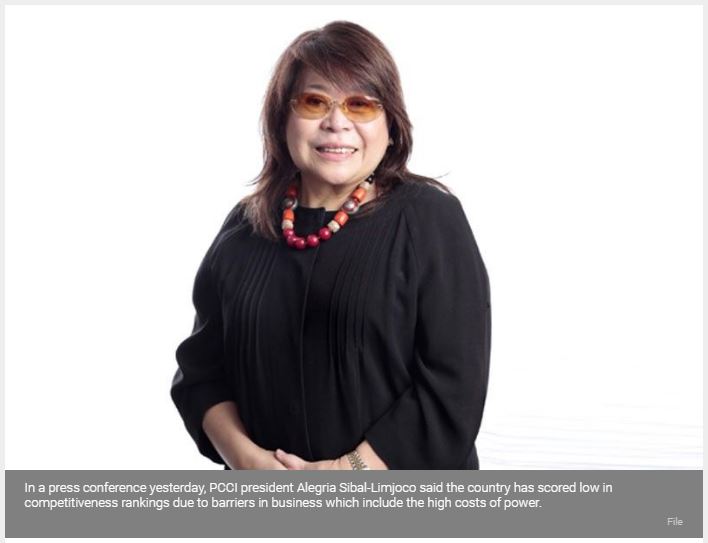Philippines: Business group prods gov’t to address high power cost
MANILA, Philippines — The government should focus in making power rates in the country competitive and address inefficient transport and telco services to attract more foreign direct investments (FDI) and achieve inclusive economic growth, the Philippine Chamber of Commerce and Industry (PCCI) said.
In a press conference yesterday, PCCI president Alegria Sibal-Limjoco said the country has scored low in competitiveness rankings due to barriers in business which include the high costs of power.
The country’s largest business group emphasized that having competitively-priced electricity is necessary in attracting more FDIs to the country.
“To effectively compete for FDIs, promote the growth of our own industries and MSMEs (micro, small and medium enterprises) and maximize the gains of regional integration, high priority should be given toward a policy that addresses a competitively-priced energy and electric power,” PCCI said.
As Southeast Asia is being considered by firms as a location for doing business, the Philippines is competing for investments in heavy industries, manufacturing and technology against countries like Thailand, Indonesia and Vietnam which have power rates lower by about P4 to P7 per kilowatt-hour.
Neighboring countries have been attracting more FDIs compared to the Philippines which attracted $6.7 billion worth of FDIs from 2013 to 2017.
In the same period, Indonesia had an average of $19.2 billion worth of FDIs, while Malaysia had $10 billion, Thailand had $8.24 billion and
Vietnam got $11.3 billion.
PCCI said with neighboring countries subsidizing power rates, the Philippines may have to consider providing subsidy as an investment which could produce major returns.
The subsidy may be in the form of tax incentives and removal of pass-through charges and burdensome tariffs such as value-added tax on franchise tax, the generation rate adjustment mechanism, feed-in-tariff and others in universal charge which the government can shoulder using the Malampaya funds.
The PCCI said the government should also stop or defer anything in the pipeline which may result in power rate increase, including the scheduled hike on tax on coal under the Tax Reform for Acceleration and Inclusion law, as well as avoid or reject proposed measures that could further hike power rates.
In addition to the high power costs, Limjoco said the other barriers to business in the country are high logistics costs, as well as inefficient transport and telco services.
“How to move forward in addressing these issues will be discussed during the Philippine Business Conference with policy makers from public and private sector as resource speakers,” she said.
PCCI chairman emeritus Francis Chua said the PCCI would be coming up with a resolution which would identify the problems faced by businesses and provide proposed solutions to be given to the government during the Philippine Business Conference.
Organized by the PCCI, the 44th Philippine Business Conference and Expo to be held on Oct. 18 to 19 at the Manila Hotel is expected gather business executives from all over the country, as well as from counterparts in the US, Japan, Turkey and Sri Lanka.
Source: https://www.philstar.com/business/2018/10/04/1856970/business-group-prods-govt-address-high-power-cost#XD67CxQlBsU3w2ed.99


 Thailand
Thailand




